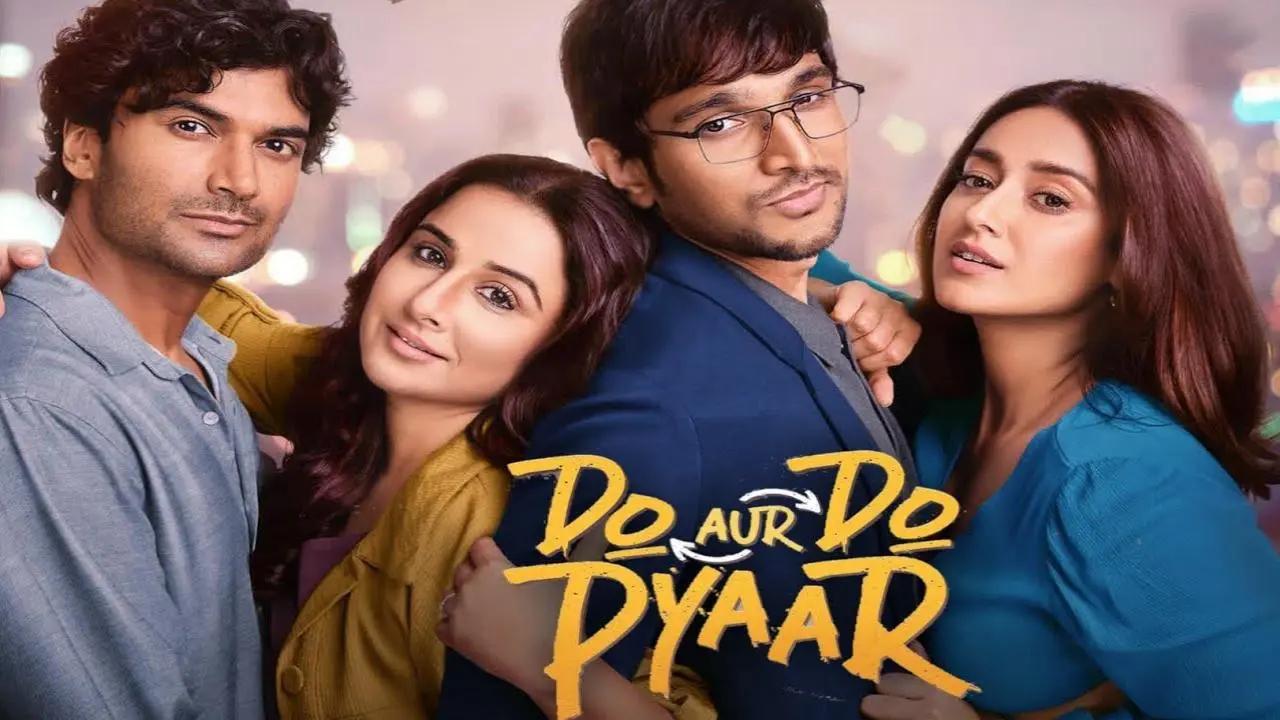The film sufficiently leaves room for interpretations, rather than over-explaining every element. And those are the best films, isn’t it?

Do Aur Do Pyaar movie review
Movie: Do Aur Do Pyaar
Director: Shirsha Guha Thakurta
Actors: Vidya Balan, Ileana D’Cruz, Pratik Gandhi
Rating: 3.5/5
There’s an analogy between toothbrush and relationships that’s quite telling, in Do Aur Do Pyaar, that I’m not gonna tell you about—because I actually want you to see the film.
But there’s something about intimacy and dental kits, that it somehow inevitably reminds me of superstar Rajesh Khanna, and his interview to a gossip rag in the ’80s.
When asked if he was in a relationship with his then girlfriend, Khanna said, “We share the same toothbrush.” This quote created quite the scandal back in the day, I’m told.
In this movie, the lead characters (Vidya Balan, Pratik Gandhi) share the same toothpaste, alright. Which would be true for any married couple, and that’s what they are.
Only, this movie is about two people cheating on their partners, as it were. Further, cheating on their extramarital love-interests as well. Who’s the third love interest this time? The original partners. As in, the wedded couple kinda go back to each other, sorta rekindling their love, so to say. Does that make sense?
Yes, once you consider that you can technically fall back in love with someone. In the same way that you fall out of love, sometimes. For no dramatic reasons at all. As is the case with the leads in this lovely pic.
From here on, the script can take the shape of any kinda movie; murder mystery, thriller, sleaze-fest... This is a rare rom-com—to my mind, the hardest genre to pull off, without getting into fields that are deliberately mawkish/corny.
The same subject is treated as a morose, mature relationship drama, in Azazel Jacobs’s The Lovers (2017), that Do Aur Do Pyaar is a credited remake of.
Why did I pay to watch The Lovers—available to buy/rent on YouTube—when I’ve just seen its desi adaptation? To check, for my interest, how well it has been adapted.
The Lovers, even when played on 2X, is a slow, frickin’ faltu film, about dull, old people, with hardly the charm and quirks of its Hindi remake.
And that’s the only time remakes make sense, no? When you can substantially better the original. Say, Jeethu Joseph’s Drishyam, for instance, was rightly inspired by The Devotion of Suspect X. But Drishyam in Hindi was a plain, ChatGPT copy of the Malayalam original—why bother, in the age of the Internet.
And who do you credit for bettering an original? The writers, always—Amrita Bagchi, Esha Chopra, Suprotim Sengupta—in this case. Also, goes without adding, the sharp, sensitive debutant director, Shirsha Guha Thakurta.
Together, I think they manage to capture, in some ways, the spirit of the times. Wherein marriage as an urban institution itself is likely to be on a secular decline.
Financial independence ensures two people needn’t tolerate each other, for the sake of it. Society is no more the issue. Having kids is an option—the only construct that makes marriages relevant still.
The couple in the movie, like so many you see around, are DINKS—double income, no kids. They’re friends first. Making memories alongside. They find love elsewhere too. But that’s no reason for extreme resentment. The idea isn’t to hurt. But to just be.
This is a solidly sorted take on adult relationships, that one comes across far more in life, than in the movies. None of the above obviously would be possible, if it wasn’t for the actors who flesh out their roles, breathing flesh and blood into it, in such a way, that I started to imagine a backstory for each, in order to understand them better. You might too.
Why’s Balan’s Tamilian character interested in a hot, NYC artsy type (Sendhil Ramamurthy)? Why’s her Bong husband (Gandhi), once with equally artistic ambitions, effectively a salesman now, so into a young, attractive actor-type (Ileana D’Cruz)?
How did this couple ease out of love, and yet remain comfortable with each other’s skin, calling each other by their last name, Ganesan, Bannerjee, as workmates so often do? Why does the wife insist on stainless steel crockery in the kitchen—how do they heat those plates in the microwave?
Okay, that last existential question apart—the film sufficiently leaves room for interpretations, rather than over-explaining every element. And those are the best films, isn’t it?
Those best films also work, because you wanna spend more and more time with the actors before you. I could do with another couple of hours of Balan lighting up the screen. D’Cruz is as luminescent—that just tells you she’s been rather under-employed since Barfi (2012).
Gandhi, returning from the hilarious Madgaon Express, is still killing it with the banter. Sorry to say, Ramamurthy is the only one, who sorely sticks out with such a soulless show.
The general sense in the market is that soft, medium-budget entertainers no more deserve space on the theatrical big screen; let alone romcoms, that anyway died in the ’90s. Also, what’s a movie without blood and inhuman gore—even simple romances deserve some deaths/destruction.
There is no knife getting twisted into any of these characters, for a twist in this tale. The worst human possibility here is a heartbreak, and that too delivered with enough sense of humour to soften the blow. That’s it, can’t recommend this more.
 Subscribe today by clicking the link and stay updated with the latest news!" Click here!
Subscribe today by clicking the link and stay updated with the latest news!" Click here!










